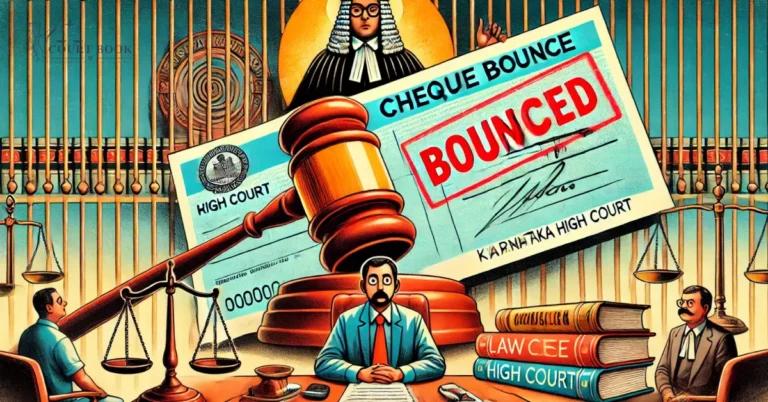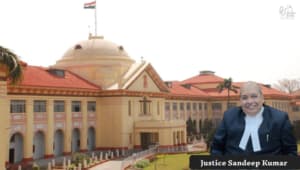The Karnataka High Court clarified that individuals convicted under Section 138 of the Negotiable Instruments Act (NI Act) for cheque dishonour should not be treated at par with those convicted under other penal statutes. Justice V Srishananda underscored the quasi-criminal nature of such cases, prioritizing compensatory justice over punitive measures. The judgment came in CRIMINAL REVISION PETITION NO. 1043 OF 2022 involving Sushil Kumar Churiwala, who sought relief from a six-month imprisonment term imposed by lower courts.
Case Background
The petitioner, Sushil Kumar Churiwala, faced conviction in 2018 under Section 138 of the NI Act for dishonouring three cheques totaling ₹22 lakhs. The trial court sentenced him to six months’ imprisonment, a ₹10,000 fine, and directed compensation of ₹22 lakhs to the complainant. The appellate court upheld the decision in 2021.
Read Also - Delhi HC Denies Bail in PMLA Case Linked to Spurious Anti-Cancer Drug Syndicate
Churiwala deposited the full compensation amount by 2022 but was arrested before completing the payment. After spending 13 days in custody (August 2–15, 2022), he approached the High Court seeking modification of his sentence. His counsel argued:
“The imprisonment term should be set aside as the compensatory amount is already paid. The fine for ‘defraying state expenses’ is unwarranted in private disputes.”
The respondent, Akshay Bansal, opposed the plea, asserting that imprisonment remains mandatory under the NI Act unless compensation is enhanced.
Key Legal Arguments
The court emphasized that Section 138 proceedings aim to ensure payment rather than punish offenders. Citing Supreme Court precedents like Damodar S. Prabhu v. Sayed Babalal H. (2010), Justice Srishananda noted:
“The compensatory aspect of the remedy should take precedence over punitive measures. Courts must focus on recovering dues for victims, not merely incarcerating offenders.”
The judgment highlighted that over 33 lakh cheque bounce cases clog Indian courts, stressing the need for pragmatic resolutions.
The High Court rejected the respondent’s argument for enhancing compensation, stating:
“Revisional powers under CrPC are supervisory, not appellate. The court can only assess if the sentence is grossly unjust.”
Referencing Rajneesh Aggarwal v. Amit J. Bhalla (2001), the bench clarified that subsequent payment doesn’t absolve criminal liability but can influence sentencing.
The court noted that while the NI Act permits imprisonment up to two years, the legislature intended fines (up to twice the cheque amount) as the primary deterrent. Justice Srishananda observed:
Read Also - Karnataka HC Pauses SC/ST Act Case Against Infosys Co-Founder Kris Gopalakrishnan and 17 IISc Faculty
“Imprisonment should be the last resort. When compensation is paid, courts must balance justice with practicality.”
Citing R. Vijayan v. Baby (2012), the court reiterated that magistrates should prioritize directing compensation equivalent to the cheque amount plus interest.
The judgment extensively discussed SC rulings guiding cheque bounce cases. In Indian Bank Association v. Union of India (2014), the Supreme Court directed expedited trials and emphasized mediation. In Meters & Instruments v. Kanchan Mehta (2018), the Court highlighted compounding as a tool for early dispute resolution. In Expeditious Trial of NI Act Cases (2021), the Supreme Court urged High Courts to reduce pendency through mediation.
The court also referenced Parliament’s 2018 amendments introducing interim compensation (Sections 143-A and 148 NI Act), underscoring the shift toward victim-centric remedies.
Read Also - Madhya Pradesh High Court Fines State Government for Alleged Violation of Land Acquisition Act
The High Court allowed the petition in part. The conviction under Section 138 NI Act was upheld, but the six-month imprisonment was set aside, considering the 13 days already served. The ₹10,000 fine was quashed as the dispute was private. The compensation of ₹22 lakhs paid by the petitioner was deemed sufficient.
The ruling reaffirms that courts must distinguish NI Act cases from conventional criminal matters. Justice Srishananda concluded:
“The accused’s custody period and full payment of dues render further imprisonment unjust. The NI Act’s purpose—ensuring cheque credibility—is fulfilled through compensation.”
Case Title: Sushil Kumar Churiwala AND Akshay Bansal















